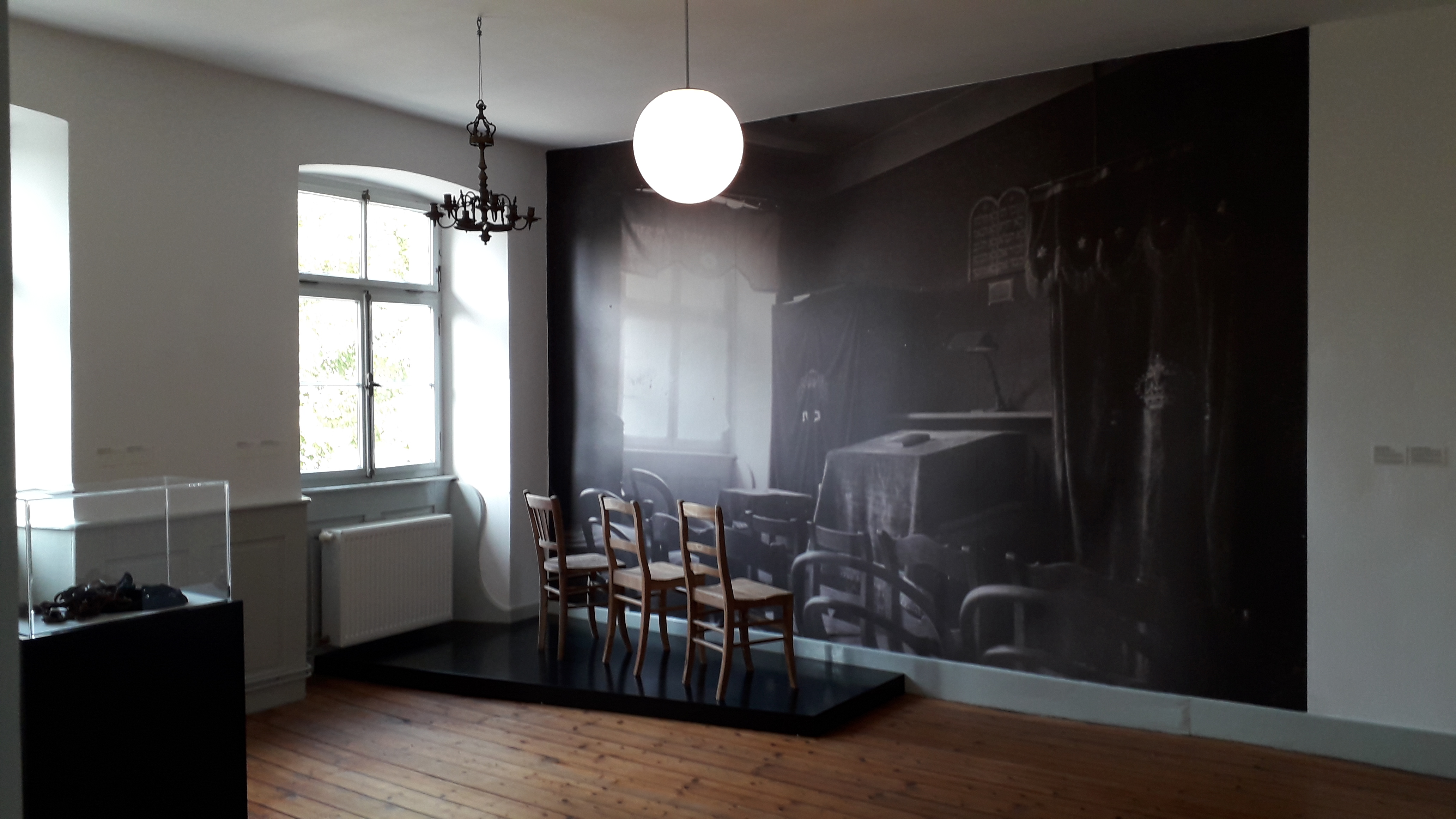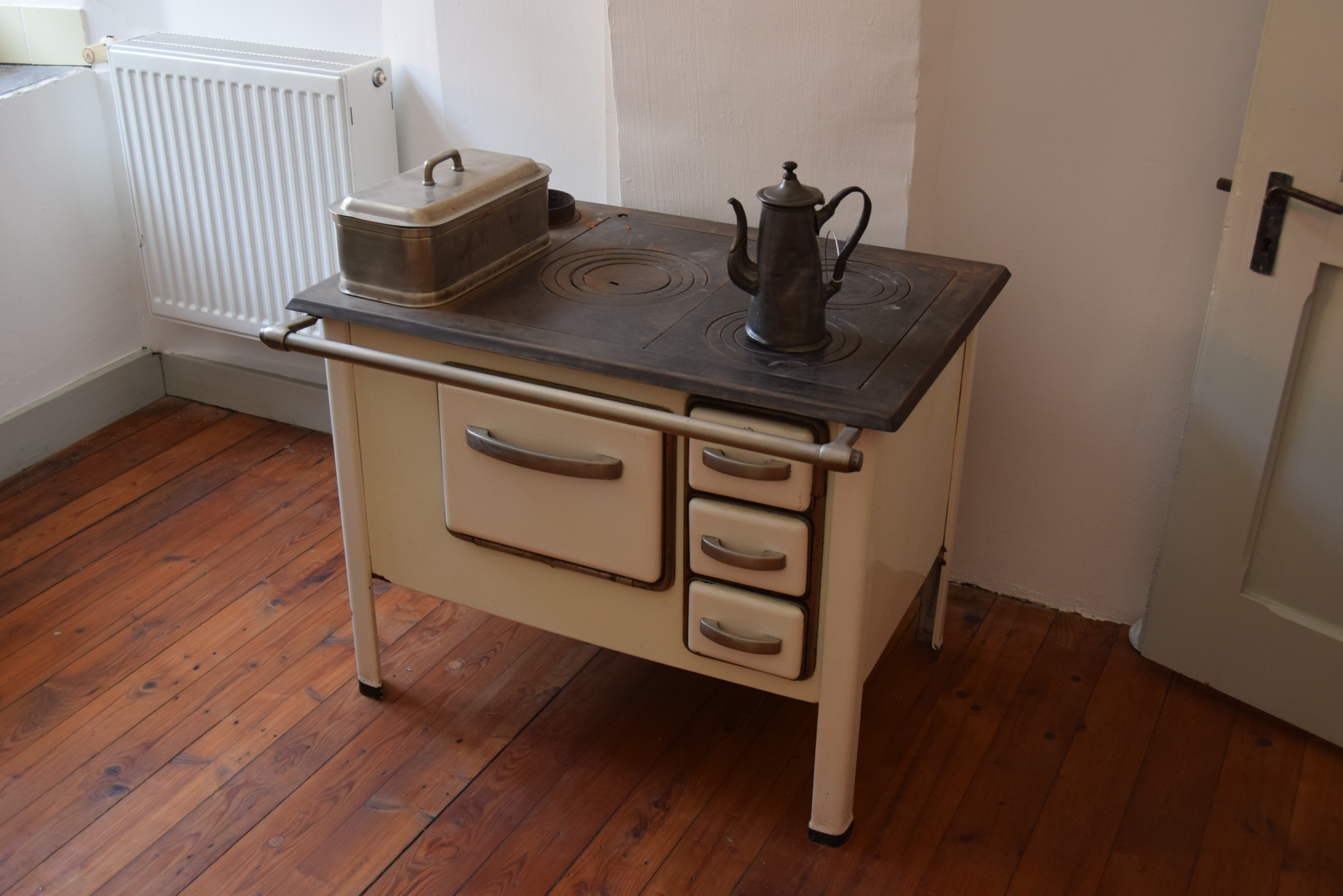9. PERMANENT EXHIBITION “JEWISH LIFE IN BREISACH 1931”
With the permanent exhibition “Jewish Life in Breisach 1931” on the upper floor of the Blue House, the association is exploring new paths in the teaching of history. The former living quarters of the last cantor Michael Eisemann and his family as well as the community room provide a lively access to everyday life of the Eisemann family and the Jewish community in the spring of 1931, shortly before the Passover celebration. The room texts (German and English) inform about the respective use of the rooms, selected key objects from the small collection of the house give an insight into the religious life as into the bourgeois everyday life.
The cheerful family photo of the Eisemann’s, Cantor Michael and his wife Clara, with their two sons Ralph and Ludwig and the Christian housekeeper Franziska, is the model of the exhibition.
In all four rooms, the community room (Alsatian: Kahlstub), the study (Herrenzimmer), the children’s room and the kitchen, radio play stations are installed for interactive use. The short radio plays, available in German and English, reflect ordinary everyday life stories of the family. It is about the school life of the boys, cooking recipes, preparations for the Passover celebration or the draft of a funeral speech, which Cantor Michael Eisemann wrote for a deceased member of the community. The scripts for the radio plays are based on interviews and recordings by Ralph Eisemann and Hans-David Blum as well as historical newspaper articles. The short dialogues illustrate exemplary everyday situations of the year 1931 in the former parish hall. It was the penultimate year in which Jewish citizens were able to live an undisturbed life in Germany before the Nazi dictatorship brought a violent end to it.
Opening Hours
Wednesdays and Sudays 2 – 5 p.m.
Further visiting hours and guided tours on request.
LEGAL INFORMATION
Curators
Christiane Walesch-Schneller, Gabriele Valeska Wilczek
Exhibition concept
Constanze Schröder, Berlin
Research Fellows
Olivia Schneller, Paula Michalk
Audio plays
Gabriele Valeska Wilczek
Audio station construction
Daniel Dorsch, Berlin
Design
Dieter Weber, modo Verlag, Freiburg
Exhibition construction
Weismann joinery, Breisach am Rhein
The exhibition was supported by the Landeszentrale für politische Bildung Baden-Württemberg (LpB) from the state of Baden-Württemberg.


THE COMMUNITY ROOM – “KAHLSTUB” (Alsation community room)
It is most likely that the synagogue council and the board of the cemetery association, founded in 1929, held their meetings here.
The east wall was set up as a prayer room in March 1939 after the synagogue was destroyed by the November pogroms.
In the winter of 1930, the community offers lectures in this space after the Sabbath services. It also serves as a classroom for Michael Eisemann’s religion class: In the fall and spring of 1931/32, he teaches Hebrew to 30 pupils and prepares them for their bar or bat mitzvahs.
Radio play “Synagogue council meeting”
Cantor Eisemann and synagogue president Hermann Bähr discuss the latest developments in the community.
Michael Eisemann, Hermann Bähr, duration: 03:03 Min.
DOWNLOAD
Radio play “A good student gets a special assignment”
While Cantor Eisemann waits for his pupils to arrive, he chats with Hans David Blum about a job that needs to be done in the old cemetery.
Michael Eisemann, Hans David Blum, duration: 02:52
DOWNLOAD

PARLOR AND STUDY
The study contains the community’s archive and library. This is where the cantor prepares for prayer services and writes his remarks for weddings and funerals. He receives visitors here, comforts mourners or otherwise advises community members.
When Michael Eisemann is busy, the doors are closed to his children. He opens the doors when the family gathers around the table for the Sabbath or other holidays. Then, the oven is stoked, the heat is turned up, and guests are welcome.
Radio play “Shabbat!”
Clara Eisemann is expecting the arrival of her husband and sons after Sabbath services. She chats with Franziska, her household help, about everyday matters.
Clara Eisemann, Franziska, duration: 01:40 Min.
DOWNLOAD
Radio play “The cantor at work”
Michael Eisemann withdraws to write a eulogy and, together with his wife, Clara, remembers their late community member fondly.
Clara and Michael Eisemann, duration: 03:10 Min.
DOWNLOAD

KOSHER KITCHEN
This is where Clara Eisemann and Franziska, her household help, prepare meals for the family. On the Sabbath, Franziska takes over in the kitchen and does all the work that observant Jews cannot perform on the day of rest according to Halacha, or Jewish law.
There are two sets of cutlery and dishes for everyday use; dairy foods may not come into contact with meat. There are two sets for Passover as well; they are kept in a box in the attic until the holiday arrives.
One can hear the garden doorbell from the kitchen. A glance out the window tells the story: The children have brought home a chicken for the cantor to slaughter.
Radio play “Seeking the best recipe: Preparing for Passover”
Clara Eisemann discusses a menu for the first day of the holiday, with Franziska, her household help.
Clara Eisemann, Franziska, duration: 02:40 Min.
DOWNLOAD
Radio play “Shopping on Judengasse Street… and some gossip”
Clara Eisemann and her housekeeper prepare a shopping list for the holidays. Where can they buy good food most economically? Residents of Judengasse come to life, through this conversation.
Clara Eisemann, Franziska, duration: 03:10 Min.
DOWNLOAD

CHILDREN’S ROOM
Rolf and Ludwig share this room. It has two beds and a wardrobe; there’s barely enough room for any other furniture.
Ludwig attends secondary school, today called the gymnasium, while Rolf goes to the Theresianum on Münsterberg, where the teachers are nuns.
The brothers play outside in the large backyard, on the street and on the ball field, together with friends from Judengasse and other classmates. On Wednesday evenings the boys train with a gymnastics club.
Every day when they come home, Rolf and Ludwig have lots of stories to tell.
Radio play “Secrets”
Rolf Eisemann and his friend Alfred gleefully describe a boyish prank among friends. The cantor lets them watch as he slaughters a chicken.
Rolf Eisemann, Alfred Weil, duration: 01:40 Min.
DOWNLOAD
Radio play “Leisure Time”
The boys want to go sledding on the Augustinerberg. But they also dream of summer and swimming in the Rhine.
Rolf, Ludwig and Clara Eisemann, duration: 01:42 Min
DOWNLOAD
AFTER THE SHOAH
This room will be opened in April 2021.
Radio play “The network of Breisach families in exile”
Letter from January 6, 1946 from Clara Eisemann in New York, USA, to Semi Uffenheimer in Buenos Aires, Argentina.
Clara Eiseman, 04:05 Min.
DOWNLOAD
Radio play “Looking back in sadness”
“I lived in this house surrounded by a happy family that was destroyed.”
Ralph Eisemann, 05:24 Min.